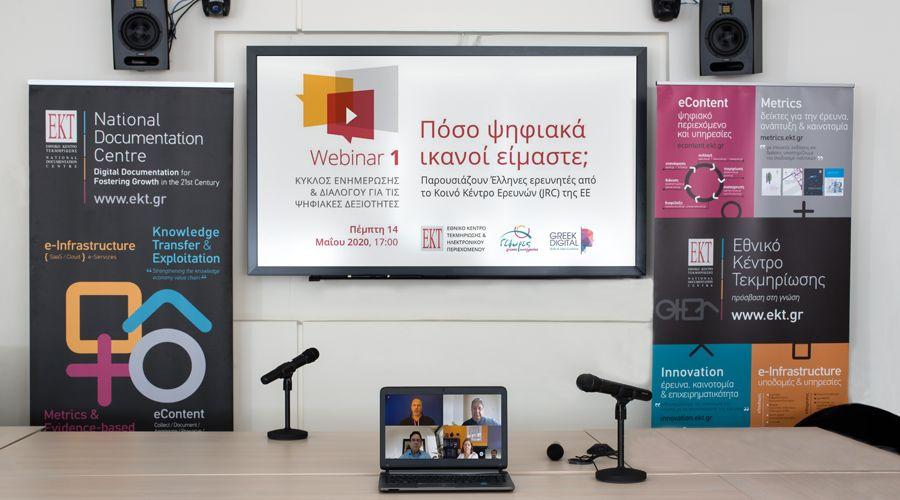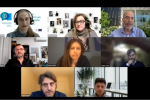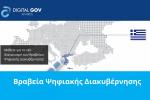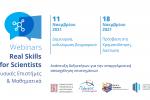
The success of and participation in the first online seminar of the National Documentation Centre (EKT) exceeded all expectations. The key question under discussion was 'How digitally competent are we as learners, teachers and educational organisations? Τheory and practice.'
On Thursday May 14 2020, 2,222 people from Greece and abroad tuned in to live presentations from Seville, Spain given by three Greek researchers from the European Commission's Joint Research Centre (JRC). For some two hours, Ioannis Maghiros, George Kapsalis and Panagiotis Kampilis, presented research data and tools developed at the JRC, and best practices for the development of digital competence.
The seminar was attended by Primary and Secondary Education teachers, employees of public organisations, freelancers, faculty members, private employees, and students from all 13 Regions of the country as well as from abroad. At any one time, there was an average of nine hundred people attending the seminar, with audience participation in polls and questions to the speakers, most ofwhich were answered live. It is worth mentioning that more than 1,000 comments and questions were submitted, which, if nothing else, shows how great the interest in the central question of the webinar is.
Watch the Seminar's Video on YouTube
In her opening address, the Director of EKT Dr. Evi Sachini, highlighted the work and role of EKT within the context of the 'National Coalition for Digital Skills and Jobs'. She went on to say that the crisis caused by COVID-19 not only accelerated the processes of digital transformation, but also highlighted the need for everyone to acquire digital skills, especially in areas such as education.
Ioannis Mageiros, Head of the Human Capital and Employment Unit, JRC Directorate, began his presentation by outlining the European Union's general guidelines for the 'green and digital transformation of the economy and society.' Based in Seville, the unit monitors, studies and proposes digital transformation actions for lifelong learning and education, with the aim of helping to empower EU citizens through the education and skills required for innovation and development.
I. Mageiros presented EntreComp, the Entrepreneurship Competence Framework, the LifeComp Skills Framework (ie the combination of personal, social and learning skills), and the DigComp Digital Competence Framework. These three frameworks scientifically outline the areas of digital capability and can therefore be used by those who design education and training initiatives to improve the digital capacity of citizens. Finally, I. Magheiros referred to the self-assesment tool (DigCompSAT), currently under development, which is intended for use in a future version of EuroPASS.
George Kapsalis, a research associate at JRC, presented DigCompEdu , the European Framework for the Digital Competence of Educators of all levels, which emphasises the pedagogical dimension of new technologies. DigCompEdu focuses on teachers' self-reflection skills, while the JRC is attempting to examine the pedagogical dimension of new technologies, highlighting the strengths of teachers and where focus should be through a questionnaire which will soon be available in its final form to the public.
"What the closure of schools due to the recent crisis has shown us is that the teacher is always at the centre of educational process and that the digital capacity of schools is more important than ever' said Panagiotis Kampilis, also a research associate at JRC, who explained that the need for mass digital transformation has led to the development of a free tool for all schools (primary, secondary, general and vocational high schools), SELFIE . This tool anonymously documents the use of educational technologies for teaching and learning. Schools can add up to 10 questions to those already in the application, based on their own needs. Only the school has access to the results that can be used for dialogue between members of the school community and the creation of a commonly accepted action plan. It is noteworthy that 89 schools in Greece have used this application, which has enabled more than 7,000 heads, teachers and students to reflect on the digital capacity of their schools.
The extremely interesting discussion was moderated by Dimitris Maragos, head/coordinator? of the 'Knowledge and Partnership Bridges' initiative, which is also implemented by EKT.
The speakers answered several questions and gave examples from the classroom, while understanding of what digital competence means was relayed through the experiences of the presenters, who also showed how digital competence can evolve. 'We use technology to acquire more opportunities and create new opportunities, ' he stressed, and declared they were available for the next seminar, thus contributing to the country's educational community being better informed.
The speakers' presentations are available here. Watch the video of the seminar with the detailed presentation of the tools and the answers of the experts to the questions of the audience.
Series of webinars on digital skills from EKT
This online seminar was an opportunity for the National Documentation Centre (EKT), in collaboration with leading national and European bodies, to strengthen the debate on the development and practice of digital skills by gathering ideas and suggestions for improving state response to the digital challenge. The debate on digital skills will continue in the near future, with speakers from Greece and around the world. The next seminar will be announced soon on ΕΚΤ’swebsite, www.ekt.gr.
Joint Research Centre
he Joint Research Centre (JRC) is the European Commission's scientific service, which contributes to the formation of European Union policies. Among the Centre's responsibilities is the exchange of know-how with EU countries, the scientific community and international partners. The Human Resources and Employment Unit of the Joint Research Centre conducts socio-economic research in the areas of education, training, lifelong learning, skills and employment. In this context, the Unit has developed a number of theoretical models and tools for self-assessment and reflection on the digital capacity of citizens (DigComp), teachers (DigCompEdu) and educational organisations (DigCompOrg & amp; SELFIE), which are used as reference frameworks. the formulation of national and European policies and action plans.
National Documentation Centre (EKT)
EKT, a supervisory body of the Ministry of Digital Governance, has a co-ordinating role in the 'National Coalition for Digital Skills and Jobs'. In collaboration with reputable organisations and in constant dialogue with the educational, research and academic community, EKT develops infrastructure and services, promoting knowledge, research and innovation in the digital space. It is also the co-ordinator of the 'Knowledge and Partnership Bridges' initiative for the networking and collaboration of Greek scientists and researchers around the world.
















